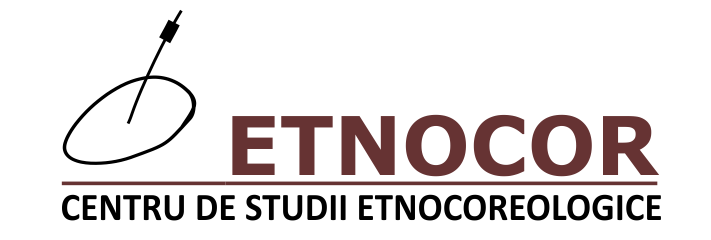THE ETHNOCHOREOLOGICAL COLLOQUIUM ,,ANCA GIURCHESCU”
first edition , 27 - 28 of October 2018ETNOCOR. CENTRE FOR ETHNOCHOREOLOGICAL STUDIES, CLUJ-NAPOCA
THE TRANSYLVANIAN MUSEUM OF ETHNOGRAPHY, CLU-NAPOCA
BABEȘ-BOLYAI UNIVERSITY,
DEPARTMENT OF CLASSICAL LANGUAGES AND LITERATURES
ORMA SODALITAS ANTHROPOLOGICA, CLUJ-NAPOCA
are pleased to invite you to attend the first edition of THE ETHNOCHOREOLOGICAL COLLOQUIUM ,,ANCA GIURCHESCU” , Cluj-Napoca, taking place between 27 th– 28 th of October 2018, in the venue of the Letters Faculty of Babeș- Bolyai University, Horea street, number 31, Cluj-Napoca, Romania.
The colloquium aims to assume and valorize, in a creative manner, the intellectual heredity of Anca Giurchescu, the most important Romanian ethnochoreologist and one of the most important members of the international community of ethnochoreologists, and also, a founder member in Etnocor. Centre For Ethnochoreological Studies.
The event is scientifically coordinated by Phd. Theresa Buckland (University of Roehampton, London, UK), Phd. Colin Quigley (University of Limerick, Limerick, Ireland) and Phd. Neagota Bogdan (Babeș-Bolyai University Cluj-Napoca, Romania).
Subjects and Themes of the Colloquium
1. EDUCATION AND CHOREUTIC FOLKLORISM: IDEOLOGIZATION, THEORIZING, EDUCATIONAL AND CULTURAL POLITICS.
The detachment of folkloric dance from its source culture was accompanied by an inclusion of traditional dance in various paradigms of folklorism, and by the development of ethnochoreology. In both these routes, the modalities of relating to the central object (dance culture) were influenced by different ideologies and theories, passed through the filters of cultural and educational policies.
Participants in the colloquium are therefore invited to explore the links and relationships which arose on the axis: traditional culture of dance – folklorism – education, and the connections that these concepts have had, over time, with the ideologies and the theories that have marked the history of the last two centuries.
Starting from there, we have formulated a number of possible key questions. How did these relationships influence the development of the various academic research schools? How did they influence folklorism and the ways of valorisation (especially on stage)? How have the accents been distributed in all these relationships on the given axis, and how did these accents lead to the modelling of the specificity of an academic tradition and the particularities of local / regional folklorism? How have these relationships been shaped by the political contexts through which they have passed?
LUDUS ET SACER – „DIACHRONICAL INTERTEXTUALITIES” AND CULTURAL ARCHAEOLOGY
The section is dedicated to both the diachrony of choreutical practices (coagulated in historically and epistemically salient forms) and non-canonical approaches to dance, coming from areas of research neighbouring the field of ethnology (such as: social and cultural anthropology, the history of religions, the history of ideas, historical anthropology, archaeology, epigraphy, philosophy).
A special place is dedicated to dances as experiences of the sacred, to the choreutical practices linked to religious contexts, ecstatic dances, therapeutic dances, dances with magic purposes, etc.
This endeavour is complementary to ethno-choreology, and aims at retrieving the holistic dimensions of dance as a plenary cultural expression, in which various languages and purposes fuse together, investing human corporality with the liminal status of imago mundi et dei. Far beyond its concrete ethno-choreutical determinations, dance brings together multiple creative levels, while remaining the best accomplished expression of the gestual pole of humanity (André Leroi-Gourhan). The generous hermeneutic perspective we propose therefore unifies the many methods of approaching the choreutic phenomenon, as well as heterogenous documentary materials, used in the archaeological reconstruction of local and regional choreutic expressions.
SCIENTIFIC COMMITTEE
dr. Theresa Buckland (Chair),UK
dr. Colin Quigley (IRL)
dr. Corina Iosif (RO)
dr. Bogdan Neagota (RO)
ORGANIZING COMMITTEE
dr. Theresa Buckland (Chair),UK
dr. Colin Quigley (IRL)
dr. Corina Iosif (RO)
dr. Bogdan Neagota (RO)
dr. Tudor Sălăgen (RO)
dr. Petac Silvestru (RO)
Proposal form
- Name of person submitting
- Mailing address
- Email address
- Phone number
- Institutional affiliation
- Title of presentation
- Type of presentation (individual, media, panel, round table)
- Technical equipment required (PC, slide projector, audio, other visual or spatial requirements, other technical requirements)
- Abstract text (no more than 300 words)
- Indicative Bibliography (up to five items)
Presentation formats
- Individual presentations: 30 minutes (including visual illustrations) + 20 minutes of discussions;
- Panel presentations: 40 minutes + 20 minutes of discussions;
- Ethnographic film projection: 30 minutes (maximum duration of a film);
- Presentations of books, CDs and DVDs: 10 minutes each title.
- All documents will be sent in Word or RTF formats.
Deadline and format
- The application form should completed and sent in Word / RTF format by September 15, 2018 to: etnocor@gmail.com, with mention ,,For Colloquium”.
Condition of participation
Each participant will be able to make a single presentation. To prevent any technical difficulty, the format of the presentation must be communicated to a person from the list of contact persons. Individual works, panels or round tables are accepted in English, which cover the topics proposed above.
The organizing committee reserves the right to accept those proposals that are appropriate to the themes proposed. The Committee will not consider proposals received after the deadline, 15 September 2018. Proposals will be examined by the Scientific Committee.
Costs
The food is provided by the organizers.
Travel and accommodation costs are assumed by the participants.
The accommodation costs 26 euros per night for the 35 places reserved at the Babes-Bolyai University Hotel, Cluj-Napoca.
For boarding / hotel booking, organizers can provide advice and support.
There ar no other costs.
Language
The language of Colloguium is English.
For roundtables dedicated to young ethnochoreologists, communication can be done in Romanian, Hungarian, English, French.
CONTACT:
Bogdan Neagota,
UBB/ ORMA Cluj-Napoca
bogdan.neagota@gmail.com
Petac Silvestru,
Etnocor/ M.E.T. Cluj-Napoca
etnocor@gmail.com
Foto 1. O menadă și doi satyri într-o procesiune dionisiacă. Roman. Anul 100 î.Hr. Din Villa Quintiliana de pe Via Appia, în sudul Romei. British Museum. Townley Collection. GR 1805.7-3.126 (Sculpture 2193)
Foto 2. Scenă din ritualul Călușului. Ceata de călușari din Giurgița, jud. Dolj. 2014. Autor: Petac Silvestru. Arhiva Etncor. Centru de Studii Etnocoreologice.
